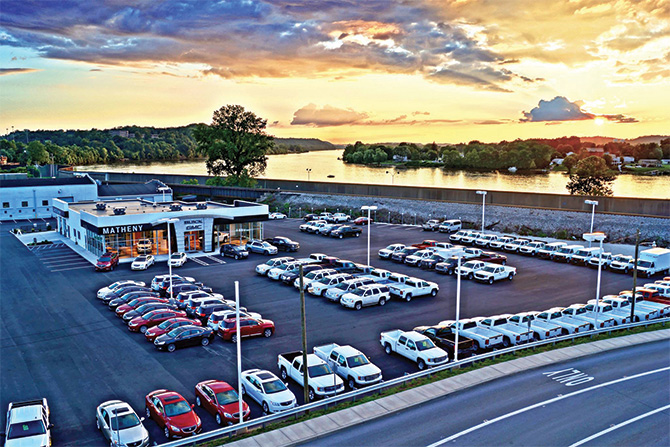By The West Virginia Automobile Dealers Association

Mike Matheny
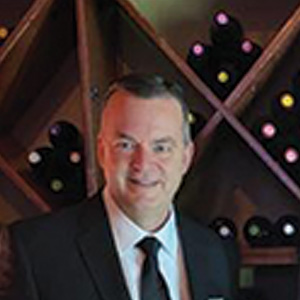
Tim Matheny
These are undoubtedly unprecedented times. What are you doing, as a small business, to weather the storm?
Mike: We’re following all the recommended CDC guidelines and taking all the necessary steps, such as social distancing, to keep employees and customers safe.
Tim: Our management team’s first priority is the health and safety of our workers and employees. West Virginia, as a whole, has been a pretty safe state when compared with other states, especially in the big cities. We’ve been pretty fortunate in that regard.
The car side of our business has mostly local traffic, but we also have a lot of truck drivers coming from the West Coast or the East Coast. We’ve had a curbside takeaway, and people can call ahead for parts. People out of our area have come to us, and we’ve met their needs. Our business is a little different from the car dealership world in that respect.
What are you doing to support your employees?
Mike: We have 350 employees and about 70 part-time employees, and we’ve had no major problems. Some of that is luck, but we’ve been doing our due diligence internally and externally.
Tim: We are trying to get problems resolved thoroughly but quickly. One way we’re trying to protect our employees is that when someone goes out of town, like Myrtle Beach, we are having them take some time off and have them take the rapid response test in case they contracted something out of town. For example, an employee went to a horse show over the weekend, and they were notified later that a friend had tested positive. We got them a two-hour test.
What are two things that you have learned from past experiences that are helping you navigate now?
Mike: Probably the biggest thing is communication, both giving it and getting it. We encourage everybody to communicate about any situations they are concerned about.
Tim: Our past experiences have helped us keep on top of the pandemic. The management team from me down, and especially my HR manager, has been engaged with employees. We engage quickly with situations for everyone’s benefit and help everyone stay away from being exposed. We have 12 locations over a few states, so it’s not like we can manage the problems under one roof.
Early on, during March and April, we had two employees who tested positive in a remote location. One generally worked by himself. The other one was a driver working in Virginia. They didn’t come in to work while waiting for results, and when the results were positive, they were treated promptly. They both recovered at home.
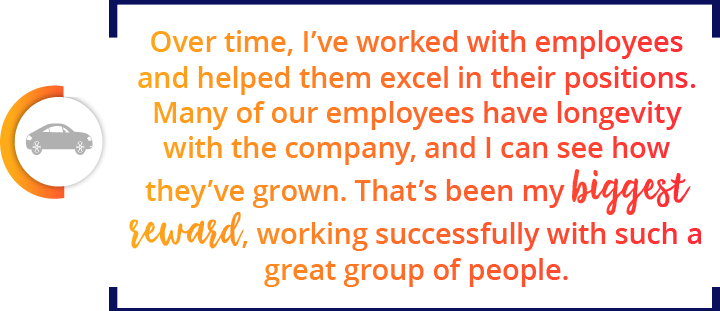
What effect do you think this crisis will have on the auto industry going forward?
Mike: It’s going to make us much more appreciative of the things we do. We’ve got to work smarter and quickly adapt to people working from home, whether permanently or part-time, and focus on how we build our relationships with our customers. For example, some customers will feel more comfortable dealing electronically as much as possible, as opposed to face time, and some people are going to limit the amount of in-person face time. We need to be in tune with what each one wants.
Tim: There’s not much time with parts and service. As far as the sales process is concerned, that’s probably changed forever. The internet has been such a prevalent factor in the last 10 years anyway, and people are still wary after the March shutdown. They are not even coming to the dealership, and everyone has less personal contact. Even when a customer test-drives a vehicle, we may take it to their house and leave it overnight so they can drive it. That makes them feel a little safer.
As a small business owner and leader, what is the takeaway from this extraordinary experience that will guide future business decisions?
Mike: No. 1 would be don’t take anything for granted. We have to work smarter and find different ways to communicate with employees and with customers to even it out.
Tim: You always think you can expect something like a catastrophe to happen, and you think you are prepared, but every situation is different. Our model, for now, includes possibly working remotely more; in some cases, that’s a good way to do it. We are also watching expenses more because every dollar matters now. From the management of expenses to just how we conduct our day to day business, we’ve changed how we will do business in the future.
Most of the financing institutions we do business with have worked hard to help us, but a couple of the larger, non-local banks haven’t had the personal touch they needed. We’ve forged better relationships with the banks and OEM financing companies that have worked with us, and from now on, maybe we just need to work with the people who have been good to us.
What is the most rewarding part of your career?
Mike: For me, it’s when I can help out a customer who needs help. For example, maybe a customer has a vehicle down at 4 a.m., and I can get him going by getting him the part he needs. That is true, one-on-one help in an emergency. I just like being able to help keep customers going.
Tim: A lot of our growth has been in the last 10 years, especially as we’ve made some acquisitions. When I started, we had 30 people, and now we have more than 350 employees. During that time, my dad worked with me behind the scenes, so our work has been a joint effort, but I find it rewarding to build teams in different business units. Over time, I’ve worked with employees and helped them excel in their positions. Many of our employees have longevity with the company, and I can see how they’ve grown. That’s been my biggest reward, working successfully with such a great group of people.
What do you think will be some of the dominant trends within the auto industry in the next 5-10 years?
Mike: The things experts talk about are electric type vehicles or hydrogen fuel-celled vehicles. In the long term, hydrogen is more doable than electric because of its range of operation. But right now, the technology is there for electric. I expect to see hydrogen or other alternative fuel situations in the long term. Some are out there now, but manufacturers need to make them on a scale where they are affordable. A longer driving range matters because you could go a lot further than you currently can with electric vehicles. People talk about Tesla batteries, but GM has longer-range batteries than Tesla that should be out late next year.
For traditional manufacturers, gas mileage is improving. However, I eventually expect to see hydrogen engines.
Tim: The big buzz word is electric, even though mass production might be 10 years away. Manufacturers sometimes mandate a certain number of sales. Sometimes that makes sense, and sometimes it doesn’t. An increase in electric cars is definitely where the industry is going for the foreseeable future. A lot of people are talking about hydrogen engines after electric ones, but that is further out. Engineers and designers are working on both engine types side by side; time will tell who succeeds.
Electric vehicles will change the landscape of repair facilities. For example, a Tesla vehicle has 21 moving parts. That translates into less that can go wrong, especially when you also consider safety features and crash avoidance. Manufacturers are building safer vehicles.
The shift won’t happen tomorrow, but in 10 to 20 years, we will see increases in maintenance versus repair in a lot of cases. Dealerships will evolve and will look different from the way they are now.
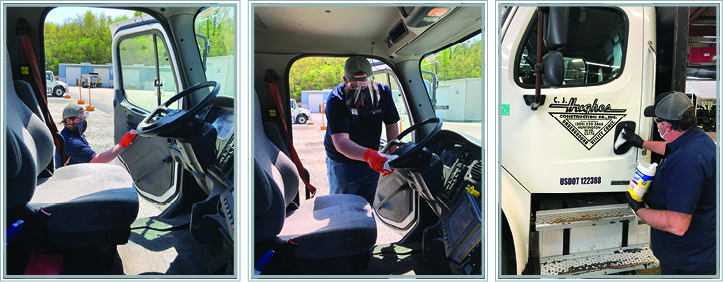
Why is being a WVADA member important? What makes WVADA membership beneficial?
Mike: Having an association is the best way to handle problems that affect all dealers. In the association, we have a place to discuss problems that are unique to West Virginia and decide how to solve them. Also, there are larger problems in the U.S.A. that we are all going to encounter. We work together on those, too.
Tim: Our dealer association has always been a strong organization. The association works with the dealers on regulations, helps pass legislation that is good for the dealer and the customer and brings people together to work collectively and not as competitors. It’s a close-knit group. For the most part, our dealerships and the dealer principals all have the same goals: creating a good working situation for our employees and giving back to communities. The association, like the dealerships, supports community organizations like schools and the Boys and Girls club. The association has been a good conduit for directing support.
Did you have past experiences that helped your leadership in WVADA?
Mike: My background in our company was a big help. We diversified the products we sold, and we had a lot of experience with manufacturers. I could see both sides of the coin. I always did a lot of listening during my interactions with manufacturers and when I was dealing with dealers all over the country. You can always learn something from other dealers, whether in Montana, Florida or West Virginia.
Tim: I grew up around most of the dealers in the association. It’s a well-run association, and I am sure it will be strong in the future. I am currently on a couple of boards, first for a trucking association and later for a car dealership. I’ve also been serving on a federal reserve roundtable for a couple of years.
My dad has been an association board member, but I haven’t been. I’ve gotten more involved with the association in the last few years.
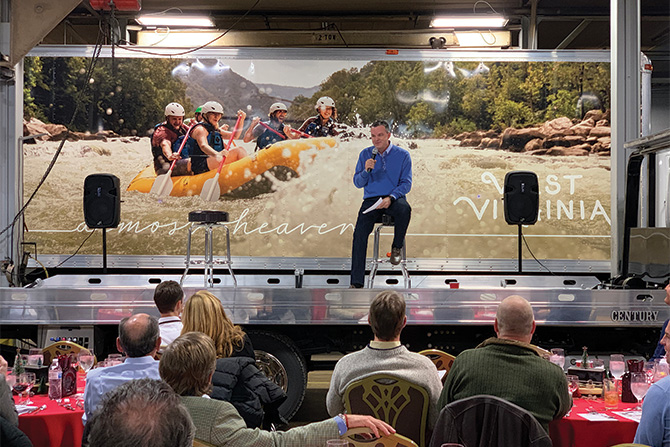
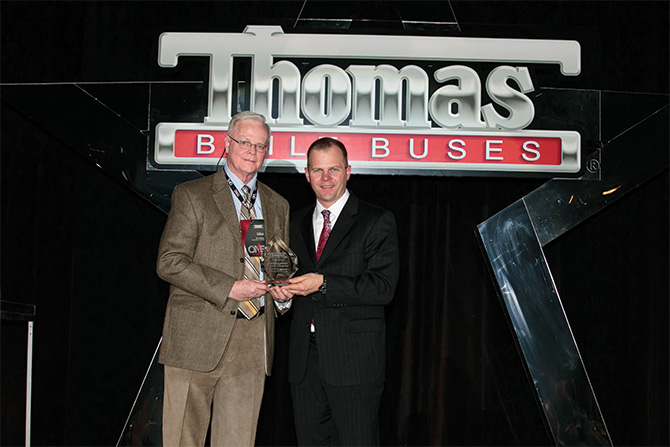

In looking back at this year, what stands out for you? Are there any accomplishments that you are especially proud of?
Mike: I am 75. Unlike Teddy Roosevelt, I don’t carry a big stick, although sometimes I’ve had to be firm. I am not a dictator. I try to do the right thing and earn people’s respect, and then they do the right thing and earn my respect. I don’t have to work quite as hard as I did, but I can still be a resource to my son and my employees. I am approachable. We can solve problems by working together.
Tim: I think I’ve realized that as the days go by and you think it can’t get any worse, sometimes it does, but our employees have done a remarkable job. We are an essential workplace with trucks going up and down the road and taking food to people. Being open and taking care of those customers is something to be proud of in a tough time, like what we are going through now. We have to hang in there and get through it. In our geographic area, I see the light at the end of the tunnel. There is nowhere to go but up.
As a leader within the local auto industry, how did you approach helping dealers face challenges at their dealerships?
Mike: I am a past president of the association, and I was a board member for 37 years. During my time of service, I tried to visit as many dealerships as I could. I got to know a lot of dealers.
When I was president, the Ford dealers were having a real problem with Ford. (Fortunately, there weren’t many situations like that.) Some dealers wanted to do things one way, and others wanted to go another way. I was a GM dealer. There was no problem with me being a GM dealer trying to help them. We sat down and tried to develop a resolution that would be agreeable to both sides as they helped themselves. Our biggest concern was our relationships with the manufacturers and the franchise laws. We tried to protect our dealers from some things that our manufacturers wanted to do to us.
Tim: Some of the dealers have gotten together in recent months. We’ve talked about keeping employees safe, what our hours of operation were and how we were trying to navigate through problems. By listening and sharing ideas, we’ve been able to help each other out in that regard.
If you look back at your career and life, what would be three things that you have learned and that you would pass onto a younger member within the auto industry?
Mike: First, don’t overreact. Think about the situation before you react. Make responsible decisions. Second, listen to your employees and associates. Consider their input, but always act responsibly to the situation. Third, don’t stray from your course. Don’t fall off the path from your objectives. Keep those uppermost.
Tim: From a personal point of view, being humble in life is one of the top characteristics an individual can have. There are two business traits I value: maintaining very open and honest relationships. That includes OEMs and the people working for them. Also, forge a good relationship with your lending institution. We’ve been with United Bank for over 90 years, and we’ve had a great relationship through ups and downs.
If you could describe the best day in this business, what would it look like?
Mike: It’s all changed now because of the internet. I go home, and the next day there are 30 messages, 20 of which are junk. My best day is when there is just something I need to be involved in. I enjoy solving problems, answering my mail and being with my employees.
Tim: Sometimes, an individual customer comes in and wants to purchase a vehicle, or someone has to solve a specific trucking problem, and they are anxious about the purchase. We help them, and they become repeat customers over the years. Sometimes their children grow up and become customers, too. We have commercial businesses and families that we’ve done business with for more than one generation. My best day is creating and being part of these longlasting relationships.
The West Virginia Automobile Dealers Association
This story appears in the 2019-2020 Issue 4 of the WVADA Magazine.

